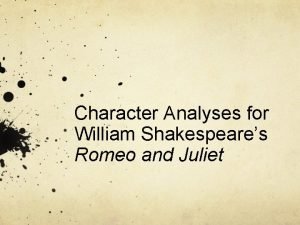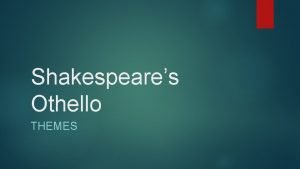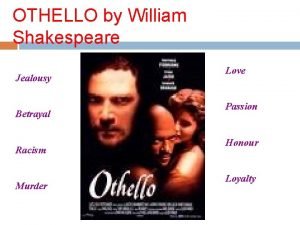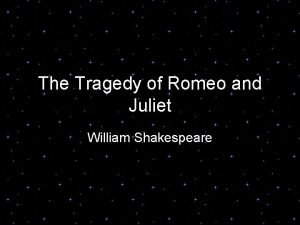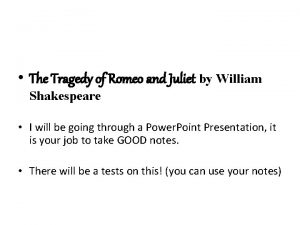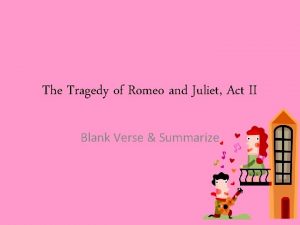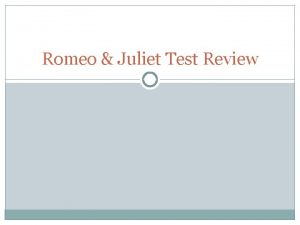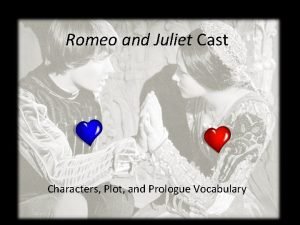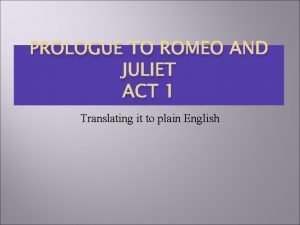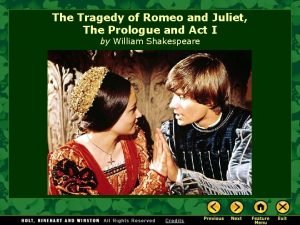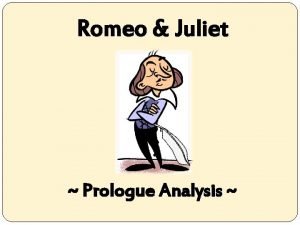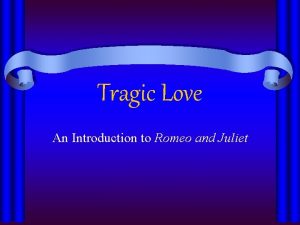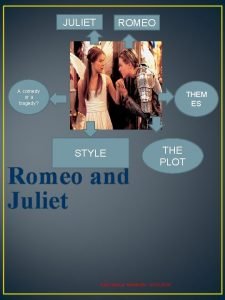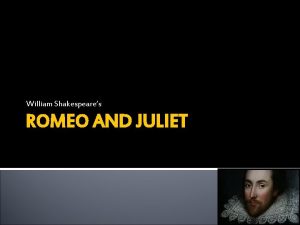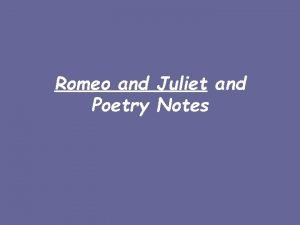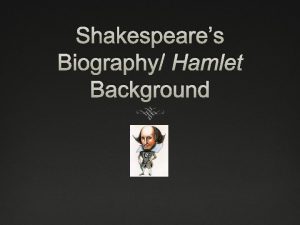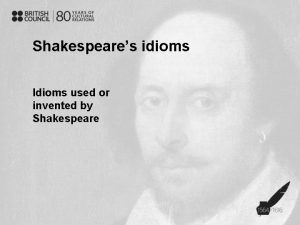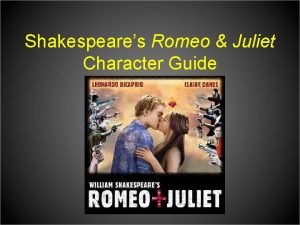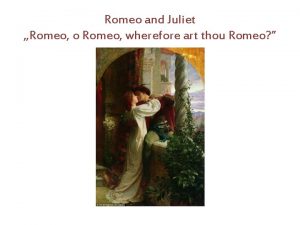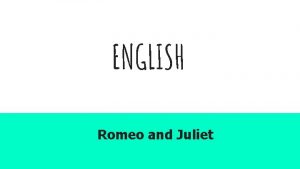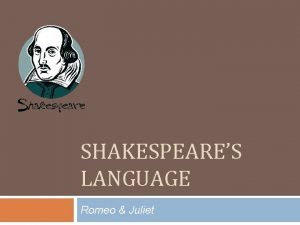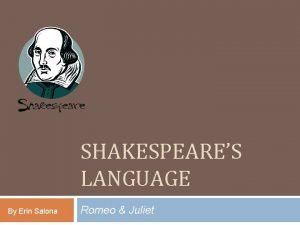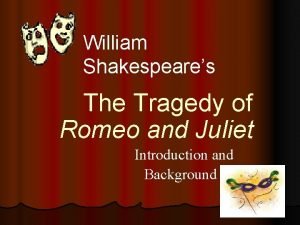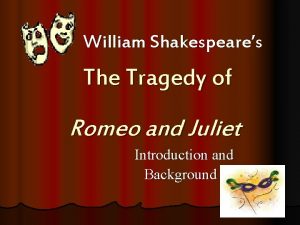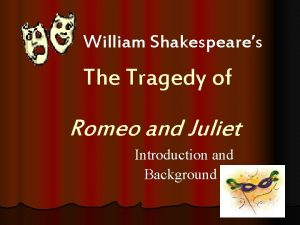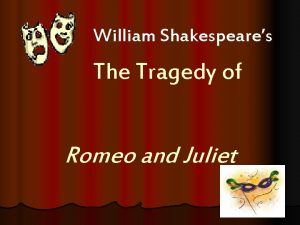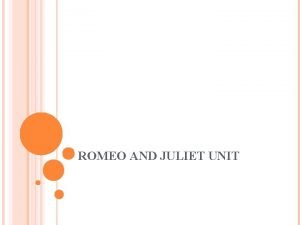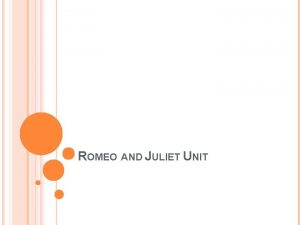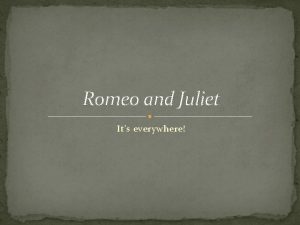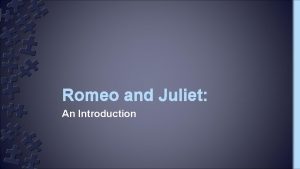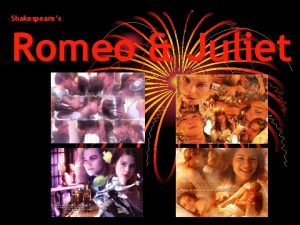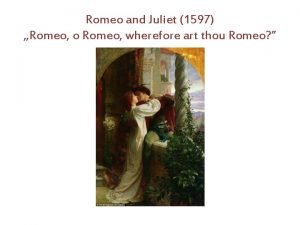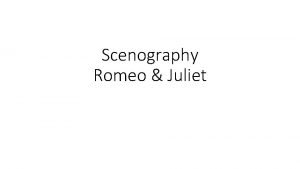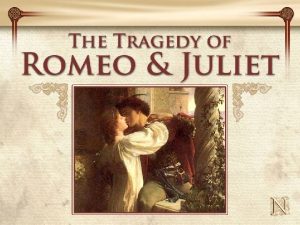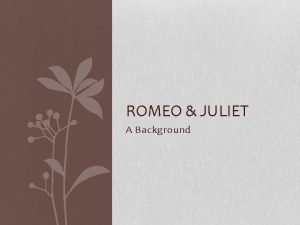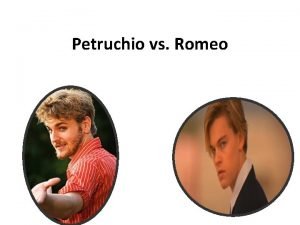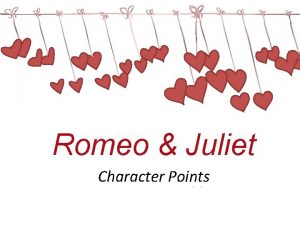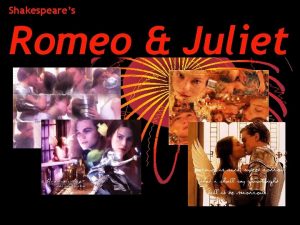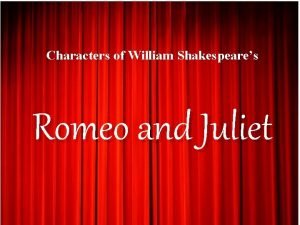Romeo and Juliet The Tragedy Written in Shakespeares
























- Slides: 24

Romeo and Juliet

The Tragedy • Written in Shakespeare’s early career about 1591. • Tale of two young starcrossed lovers. • Most popular archetypal stories of young, teenage lovers. • Based on Arthur Brooke’s The Tragical History of Romeus and Juliet.

Montagues

Montagues • • • Romeo-son of Montague Lord Montague-Romeo’ dad Lady Montague-Romeo’s mom Benvolio-Romeo’s cousin/friend Balthasar- servant of Romeo Abram-servant of Montague

Capulets

Capulets Juliet-daughter of Capulet Lord Capulet- Juliet’s dad Lady Capulet- Juliet’s mom Nurse-Juliet’s servant Peter- servant to Nurse Tybalt- Juliet’s cousin, nephew of Capulet Sampson- servant Gregory-servant

Others

Other Characters Chorus- actor who introduces Act I and II Prince Escalus- ruler of Verona Count Paris- young nobleman, relative of Prince Page- servant to Paris Mercutio- Romeo’s friend, relative of Prince Friar Lawrence- priest Friar John- priest Apothecary- pharmacist/druggist

Drama • A story performed by actors on a stage in front of an audience.

Acts • A major division (stop) in the action of the play. • Shakespeare’s plays were always 5 Acts.

Scenes • A division of an Act.

Protagonist • Central character in the story around which the plot is centered. • Usually seen as the “good” guy.

Antagonist • A character who sets up obstacles for the protagonist. • Usually seen as the “bad” guy.

Soliloquy • Actor is alone on stage and speaks his thoughts out loud.

Aside • a character’s direct address to the audience, which is not heard by the other characters.

Dramatic Irony • The audience or the reader knows something important that a character in the play does not know.

Puns • A humorous play on words. • Mercutio: “Nay, gently Romeo, we must have you dance. ” • Romeo: “Not I, believe me. You have dancing shoes / With nimble soles; I have a soul of lead…” (Act 1. 4).

Allusions • A reference to a well known work of art, music, literature or history. • “At lovers’ perjuries, they say Jove laughs” (Act 2. 2). • Jove is another name for Jupiter, the Roman King of the Gods.

Metaphor • A direct comparison between two unlike things. • Romeo: “But, soft! What light through yonder window breaks? / Is it the east, and Juliet is the sun” (Act 2. 2).

Personification • Occurs when an inanimate object or concept is given the qualities of a person or animal. • Juliet: “For thou wilt lie upon the wings of night / Whiter than new snow on a raven’s back. / Come, gently night, come, loving blackbrow’d night” (Act 2. 2).

Oxymorons • Describes when two juxtaposed words have opposing or very diverse meanings. • Juliet: “Beautiful tyrant! Fiend angelical!” (Act 3. 2)

Paradox • Statement or situation with seemingly contradictory or incompatible components. • Juliet: “O serpent heart, hid with a flowering face” (Act 3. 2).

Foreshadowing • Reference to something that will happen later in the story. • Juliet: “Give me my Romeo; and, when he shall die, / Take him and cut him out in little stars, / And he will make the face of heaven so fine / That all the world will be in love with night / And pay no worship to garish sun” (Act 3. 2).

Themes • Light/Dark – Sun, torches/night, gloom • Love/Hate • Love/Lust • Time – Hours, rushed • Fate/Free Will – “star-crossed, ” fate, destiny, the stars
 Minor characters in romeo and juliet
Minor characters in romeo and juliet Othello jealousy theme
Othello jealousy theme Shakespeares tragedy about racism and jealousy
Shakespeares tragedy about racism and jealousy Romeo and juliet scripts
Romeo and juliet scripts William shakespeare’s ‘romeo and juliet’ is a ______.
William shakespeare’s ‘romeo and juliet’ is a ______. Romeo and juliet prologue
Romeo and juliet prologue The tragedy of romeo and juliet
The tragedy of romeo and juliet The tragedy of romeo and juliet by william shakespeare
The tragedy of romeo and juliet by william shakespeare Procure definition romeo and juliet
Procure definition romeo and juliet Romeo and juliet test with answer key
Romeo and juliet test with answer key Romeo and juliet plot structure
Romeo and juliet plot structure Romeo and juliet by william shakespeare summary
Romeo and juliet by william shakespeare summary Prologue to romeo and juliet
Prologue to romeo and juliet Iambic pentameter romeo and juliet
Iambic pentameter romeo and juliet What is the rhyme scheme of the prologue?
What is the rhyme scheme of the prologue? Introduction about romeo and juliet
Introduction about romeo and juliet Is romeo and juliet a comedy or tragedy
Is romeo and juliet a comedy or tragedy Example of a simile in romeo and juliet
Example of a simile in romeo and juliet Prose in romeo and juliet
Prose in romeo and juliet Shakespeare 1587
Shakespeare 1587 Themes of hamlet
Themes of hamlet Shakespeares idioms
Shakespeares idioms Character traits of lady montague
Character traits of lady montague Romeo and juliet script oh romeo i've missed you
Romeo and juliet script oh romeo i've missed you Romeo and juliet act 1 scene 3 quotes
Romeo and juliet act 1 scene 3 quotes
